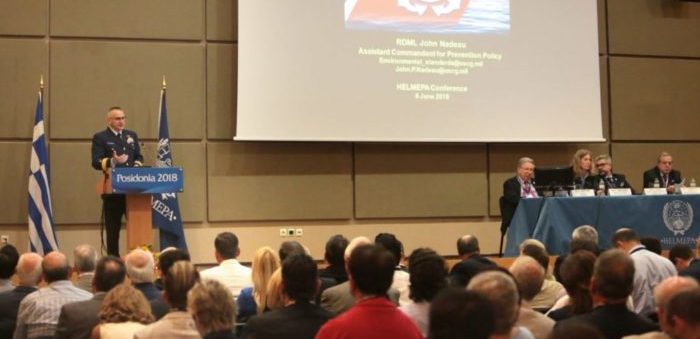Rear Adm. John Nadeau, assistant commandant for prevention policy, represented the US Coast Guard at the Posidonia and gave his perspective on the implementation of the upcoming IMO 2020 global sulphur cap.
Mr. Nadeau noted that availability of compliant fuel oil has not been a problem in general, and in a number of cases failure to get compliant fuel is a result of poor voyage planning, not due to shortage. However, if operators are unable to acquire Emission Control Areas (ECA) compliant fuel because it was unavailable, they could report these instances to the EPA.
[smlsubform prepend=”GET THE SAFETY4SEA IN YOUR INBOX!” showname=false emailtxt=”” emailholder=”Enter your email address” showsubmit=true submittxt=”Submit” jsthanks=false thankyou=”Thank you for subscribing to our mailing list”]
USCG doesn’t believe there will be a shortage of 0.5% compliant fuel. There may be instances of regional non-availability because of the implementation of the new cap, but this can be mitigated with the transport of compliant fuels to areas where it is not available.
Mr,. Nadeau continued by saying that USCG conducts about 9,500 regularly scheduled Port State Control exams every year. In the last three 3.5 years, 80 deficiencies and over a dozen enforcement actions were reported. These resulted in civil penalties, fines for failure to switch fuels before entering the ECA, failure to burn compliant fuel, and incomplete bunker delivery notes and other records.
We agree with industry concerns that without consistent global implementation and enforcement of the 0.5 percent global cap in 2020 some ship owners will be afforded a competitive advantage over those companies that do comply. As with all environmental requirements, you can expect to see a strong effort within our Port State Control program to ensure compliance with these sulfur limits.
To implement its Port State Control program, John Nadeau mentioned that if during a Port State Control boarding USCG discovers that a vessel has used fuel above the sulphur cap it its ECA, it will refer the evidence to the vessel’s flag state for further investigation and enforcement action. On US vessels USCG will continue to take action as it currently does.


































































